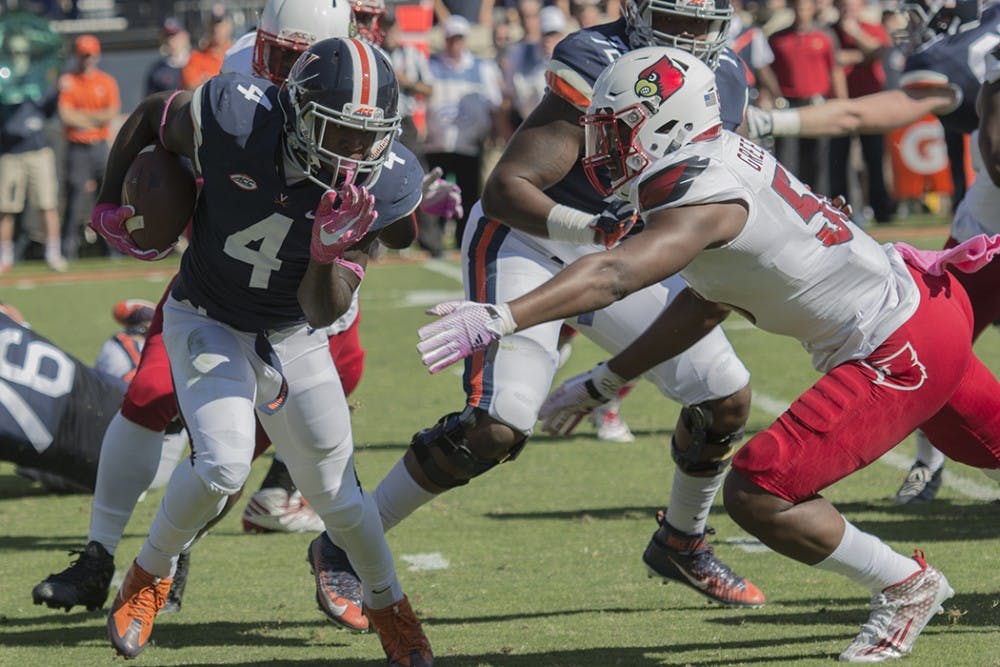Former Virginia running back Taquan Mizzell participated Saturday in the NFLPA Collegiate Bowl, one of many pre-draft exhibition games for NFL hopefuls. The former five-star recruit amassed 96 rushing yards on nine attempts while also scoring a touchdown.
Although never the true gamebreaker many fans anticipated, Mizzell steadily improved over his four years in Charlottesville. More quick than necessarily fast — despite what his moniker “Smoke” might suggest — he became the first player in ACC history with both 1,500 rushing and receiving yards.
The television announcers for the NFLPA bowl seemed to think the Virginia Beach, Va. native has a future on Sundays.
“I think he’s the prototypical third-down back,” the analyst said. “Obviously, there are an abundance of spots available in the National Football League for guys … with the specialty and speed and suddenness on the outside to move the chains, and he certainly has that.”
Still, there is no guarantee Mizzell will be drafted come April. In fact, 2017 could be the first year since 1983 that no Cavalier is selected in the NFL draft. That is a telling statistic for the state of Virginia’s football program.
Over the past decade, Virginia has seen a drop off in the number of players it sends to the NFL. Seven Cavaliers were drafted in 2005 and five were selected in 2006, not including linebacker Ahmad Brooks who was taken in that year’s supplemental draft.
In 2008, three players were taken, but two of those were first-rounders — defensive end Chris Long and offensive lineman Branden Albert.
But in five of the past seven years, Virginia has only had one player selected. Virginia hasn’t had a player taken in the first round since offensive tackle Eugene Monroe in 2009. The highest Cavalier drafted since then was cornerback Ras-I Dowling at 33rd overall in 2011 by New England. The Patriots cut him in 2013.
Certainly there are differences between the college and pro game. Good college players are not necessarily good NFL players — just ask Matt Leinart or Trent Richardson — and bad college teams can produce good NFL players. But one truth that generally holds is good college teams have NFL-caliber athletes.
Alabama has 43 players currently playing in the NFL while Clemson has 33 — the most and seventh most of any college team, respectively. Ohio State, another one of this year’s College Football Playoff participants, has 39.
Meanwhile, Virginia has 19 players in the NFL. Taken by itself, that number is respectable. The program’s fiercest rivals have similar numbers — Virginia Tech with 15 and North Carolina with 23.
But Virginia has not had a true difference maker in the league in years. While Virginia Tech has players like Kam Chancellor, Tyrod Taylor and Kyle Fuller and North Carolina has talent like Robert Quinn, Giovani Bernard and likely Mitch Trubisky soon, Virginia fans are left wondering which team offensive lineman Oday Aboushi is now playing for.
Just look at Sunday’s NFL conference championship games. Virginia had only three players compete, and two of them were backups — Atlanta linebacker LaRoy Reynolds and quarterback Matt Schaub — and two of them were nearing retirement – Schaub and New England defensive end Chris Long.
Simply put, despite what some recruiting rankings might have said in the early years of coach Mike London’s tenure, Virginia has not had the talent to compete in an ever-competitive ACC that affects the team’s lowly record year-after-year.
"There's so many components that go into winning, but certainly the key one that you start with is talent," former Virginia coach Al Groh said in 2009. "And the more top-end talent — that is playmaking talent, guys who can just make the play — that makes the difference."
With Mizzell gone to pursue an NFL career, the play-making talent on next year’s Virginia team looks bleak. Offensively, the Cavaliers will have junior wide receiver Olamide Zaccheaus, who led the team with seven touchdowns last season, but his play was inconsistent at best. The rest of the offense — receiving, running backs and quarterbacks — is largely unproven.
Virginia has two future NFL players in senior linebacker Micah Kiser and senior safety Quin Blanding on the defensive side of the ball, but aside from them, the talent is shaky. Senior defensive end Andrew Brown will have one last season to justify his five-star high school rating, and newcomers Chris Peace, Landan Word and Bryce Hall will have to take the next step.
Coach Bronco Mendenhall’s first season was one to forget, marred by overconfidence and failed game plans. But you also can’t forget how Richmond physically dominated the Cavaliers in the opener or how Virginia could not move the ball against a 3-9 Connecticut team. Virginia did not have the players to compete in its non-conference schedule, much less the ACC this season.
Blame it on recruiting or player development — both play a role. The bottom line is Virginia does not have much NFL talent on its roster. If that doesn’t change, Mendenhall will meet the same fate as his predecessors Groh and London sooner rather than later.
Robert Elder was the 127th Sports Editor for The Cavalier Daily. He can be reached at r.elder@cavalierdaily.com or on Twitter at @R_F_D_E.







